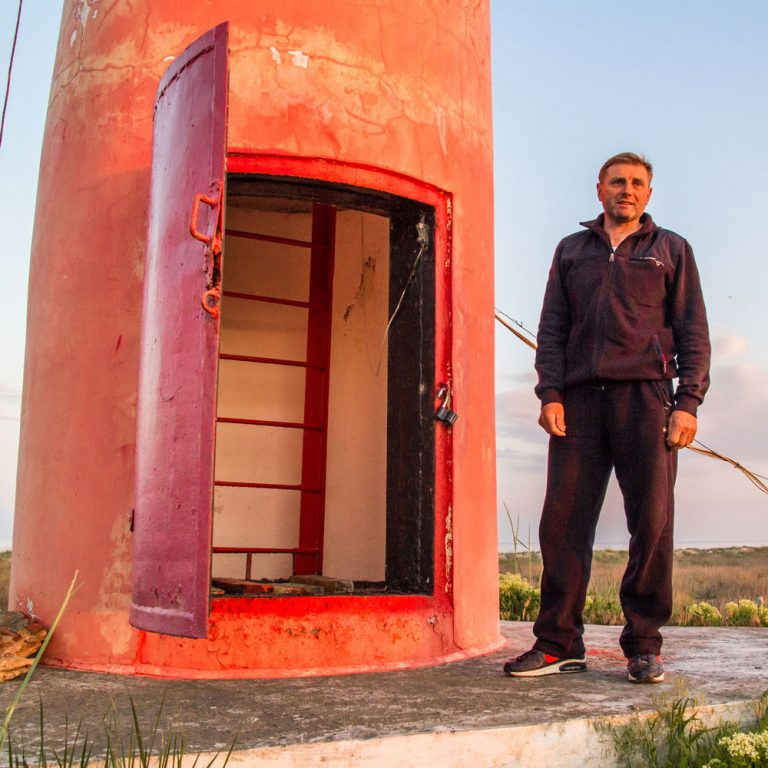In Bessarabia there are three villages with the same name of Prymorske, and all three of them are resorts. Prymorske (former Shahany) which we’ll talk about here is located in Tatarbunary district. The village was founded by Cossacks of Transdanub Sich at the site of old Tatar settlement Biyuk Shagin. Here, on the shore of Malyi Sasyk and Dzhantshei coastal lakes, there is Roseika mud bath health resort. These water reservoirs are a part of Tuzla Coastal Lakes nature park founded in 2010. Ukraine renewed its membership in Ramsard Convention 15 before and included “Shahany-Alibei-Burnas” coastal lakes system into the List of the Wetlands of International Importance. They are protected as the breeding ground for many water fowl species.
One of the largest flyways used by birds to get to Europe, Asia and Africa passes through Tuzla Coastal Lakes. 254 birds species lives on the park grounds. A quarter of them are listed in Red Book of Ukraine and other nature protection lists.
A spit of land almost 50 km long and 100-300 metres wide isolates the coastal lakes from the sea. A same-name lighthouse stands on this very spit, opposite Shagany coastal lake. Together with the lighthouse on Zmiinyi island it signals a danger area of Romanian Zmiinyi rock and secures navigational safety at the approaches to Ust-Dunaysk commercial seaport.
Shahany lighthouse has been working as navigation lights since 1944. It was refurbished in the 60s, and in the 80s this 16 metres tall construction was switched to the automatic mode.
history
Owing to the inventor of the sun valve Gustaf Dalen, construction of lighthouses became more automatic in the 20th century. As navigation and GPS technology moved forward, number of non-automated lighthouses decreased even more.
Viktor
Viktor Sakara has been working as a lighthouse keeper for 16 years now. He lives in Prymorske and is a signal man by education. Viktor was a commander of operation command vehicle in the army. He served in Azerbaijan and participated in Nagorny Karabakh conflict. He returned to Prymorske after army discharge and worked as a director of a local cultural center for some time.
Viktor Sakara didn’t dream to become a lighthouse keeper, but when a vacancy of a light keeper opened, he went for it at once:
— I’m both an operator and a technician here. I service it all on my own. I’ve been doing this job and will keep doing it, because I like it and I’m used to it.
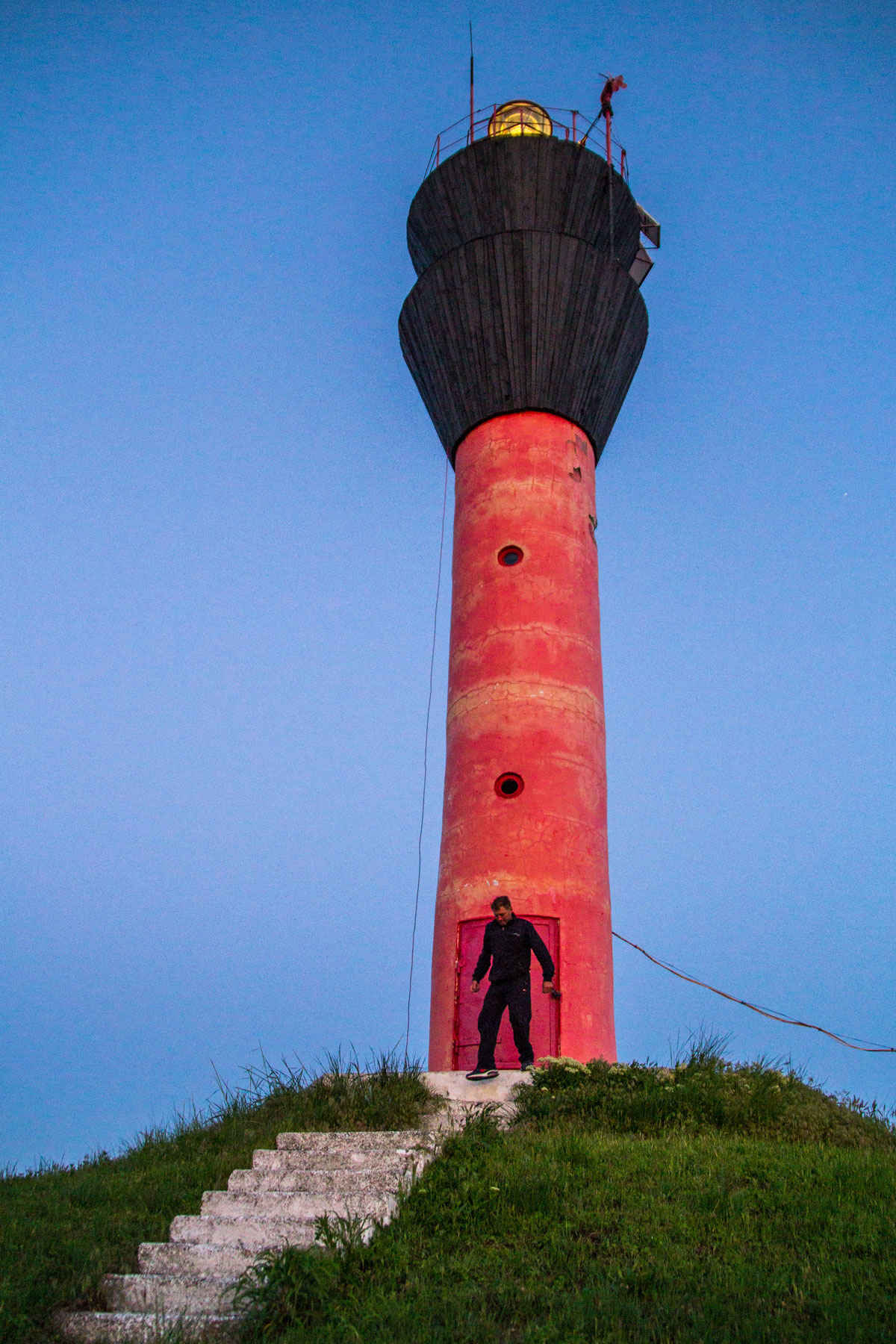
There were plans to modernize the lighthouse this summer: cover the tower with metal, replace the fence and install a screen inside.
— When the tide is high, the sea goes up and everything here gets covered with water. Just imagine: I’m looking at the window and there is a huge wave coming in and breaking here. It’s winter. It’s cold and it’s a frightening thing to see.
There is no direct overland connection between the lighthouse and the village, as the spit of land interlaces with water. That’s why every day, regardless of the weather, Viktor puts on fishing trousers and drives his car to the edge of the mainland. Then he wades through the channel which runs into the coastal lake. Sometimes it happened so that boots froze to the ground and had to be cut off.
Viktor often stays at the lighthouse overnight. The lighthouse is the second home for him. There are four beds inside: one for a keeper and the other three – in case a repair crew comes. There’s also a potbelly stove, which comes in handy in autumn and winter when the lighthouse keeper cannot come back home every evening:
— I need to go there and have a look. I need to attend to the lighthouse every day and get it running. I take some food from home, come here and stay overnight, because coming to and fro is impossible in winter. Even if you managed to get here, it may start snowing or raining. The same is in summer. Two Caucasian Shepherd dogs spend the night with me. They lie down in the doorway and I feel much more reassured. The dogs respond to every rustle, raising their heads.
Viktor usually wakes up at 4:00 or 5:00 and gets down to work at once. He does all the routine at the lighthouse – cleaning, guarding and equipment servicing:
— I was closing the gate once, and some 15 jackals sung a song for me behind the gate. I locked them at once and called my family. They asked me: “Where are you?” and I told them: “In the zoo, just listen to it.” Both jackals and wild boar feel at home here. There are jackals’ dens in the mainland where they feed their puppies. I can hear those puppies scream in the morning when their parents bring them food.
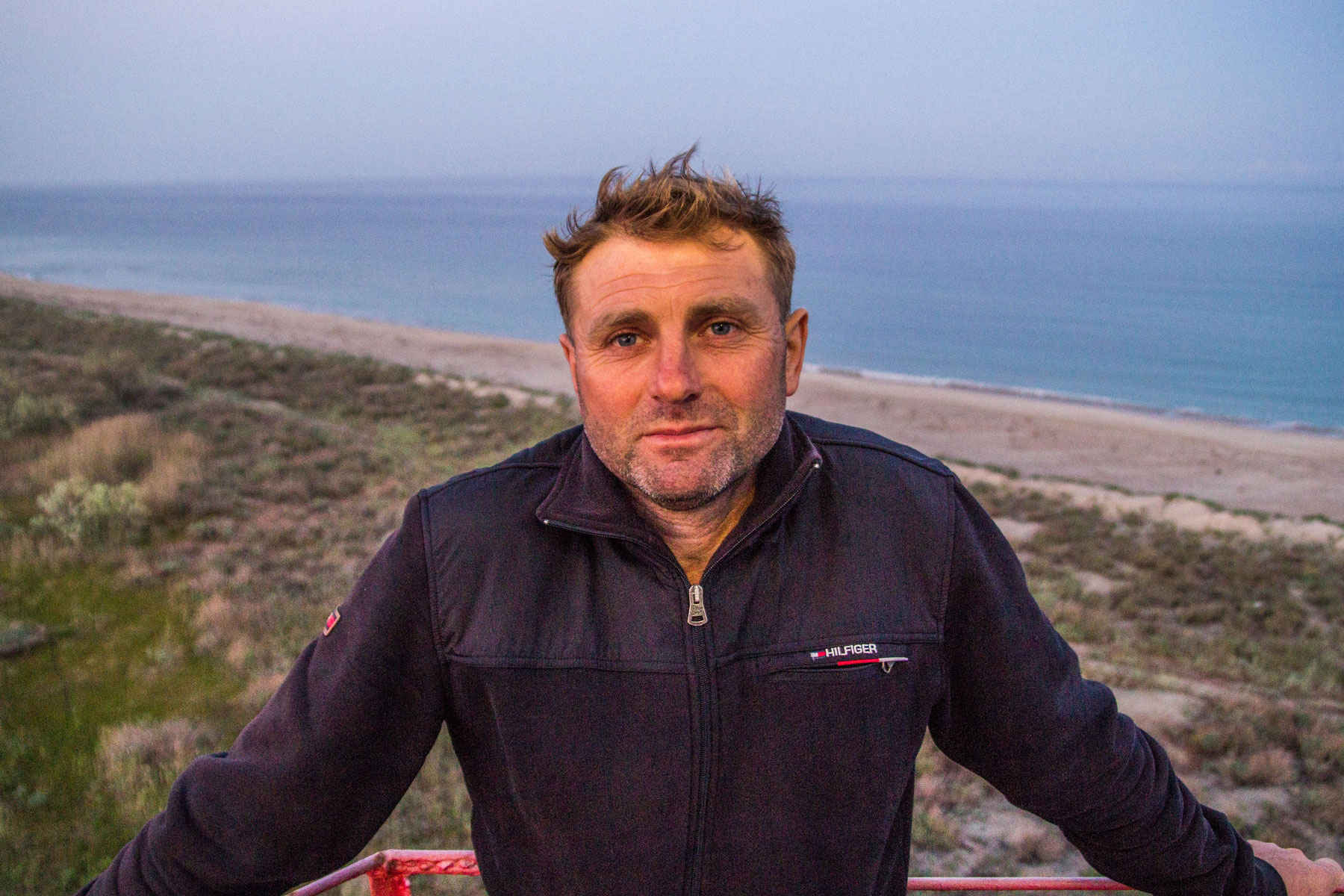
Viktor’s family treated his decision to work at the lighthouse calmly and respectfully. His wife, daughter and son visit him from time to time and help.
— My wife told me: “You took this job, it’s your choice”. And that was it. They come to me, covering 9–12 kilometres round trip across the bog, rain or shine. They have no issue with it, for they understand we are the family and that’s what we need to do.
Viktor’s grandfather used to be a keeper at the same lighthouse. The man remembers that time only from photos and stories:
— There used to be stationary nets and fishermen here. They used magunas to go out and fish in the sea. I have a photo of my granddad holding a sturgeon of some 4 kilos. He could hardly hold it. When I became a lighthouse keeper I was really surprised to find myself doing the same job as my grandfather did.
Magun
This word in local dialect means a large keel boat for seining.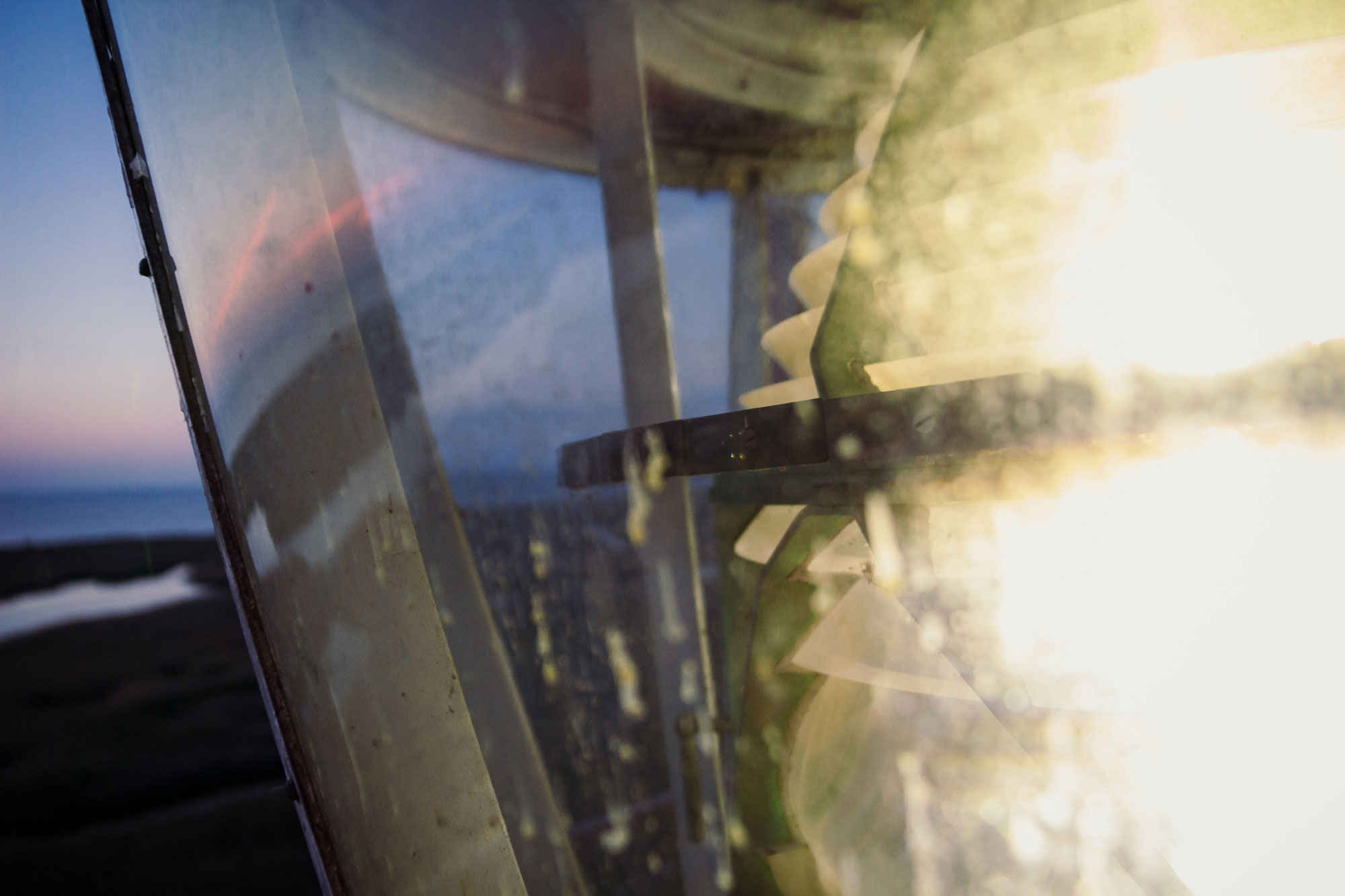
Will Viktor’s children be willing to step into his shoes? The man believes it’s still too early to talk about it:
— My son is a student of South Ukrainian National Pedagogical University. He will be a volleyball player. Does he want to work at the lighthouse? I don’t know, I haven’t asked him yet. Dashka, my little girl – she’s still young, only a fourth-grader. I haven’t asked her either. The most important thing for them is to like what they’re doing, where they study, and we will take it from there.
Viktor hoisted a Ukrainian flag over the lighthouse. The flag came into notice even in this place, where there are hardly any people:
— “Right Sector” came here once, five big fellows. They asked: “Do you know who’s a lighthouse keeper here?” It turned out they saw the flag and found me. They wanted to shake my hand. I told them I’m a Ukrainian and will always be one. My children will be Ukrainians too. I’ve always told everyone in our village: “If you hate something – get yourself a ticket and board a train. Magadan [a town in the Russian Far East – ed.] is large enough. Go there and don’t stir up trouble. I’ll pay the rest, help you buy a ticket and good riddance to you.” There many such people here.
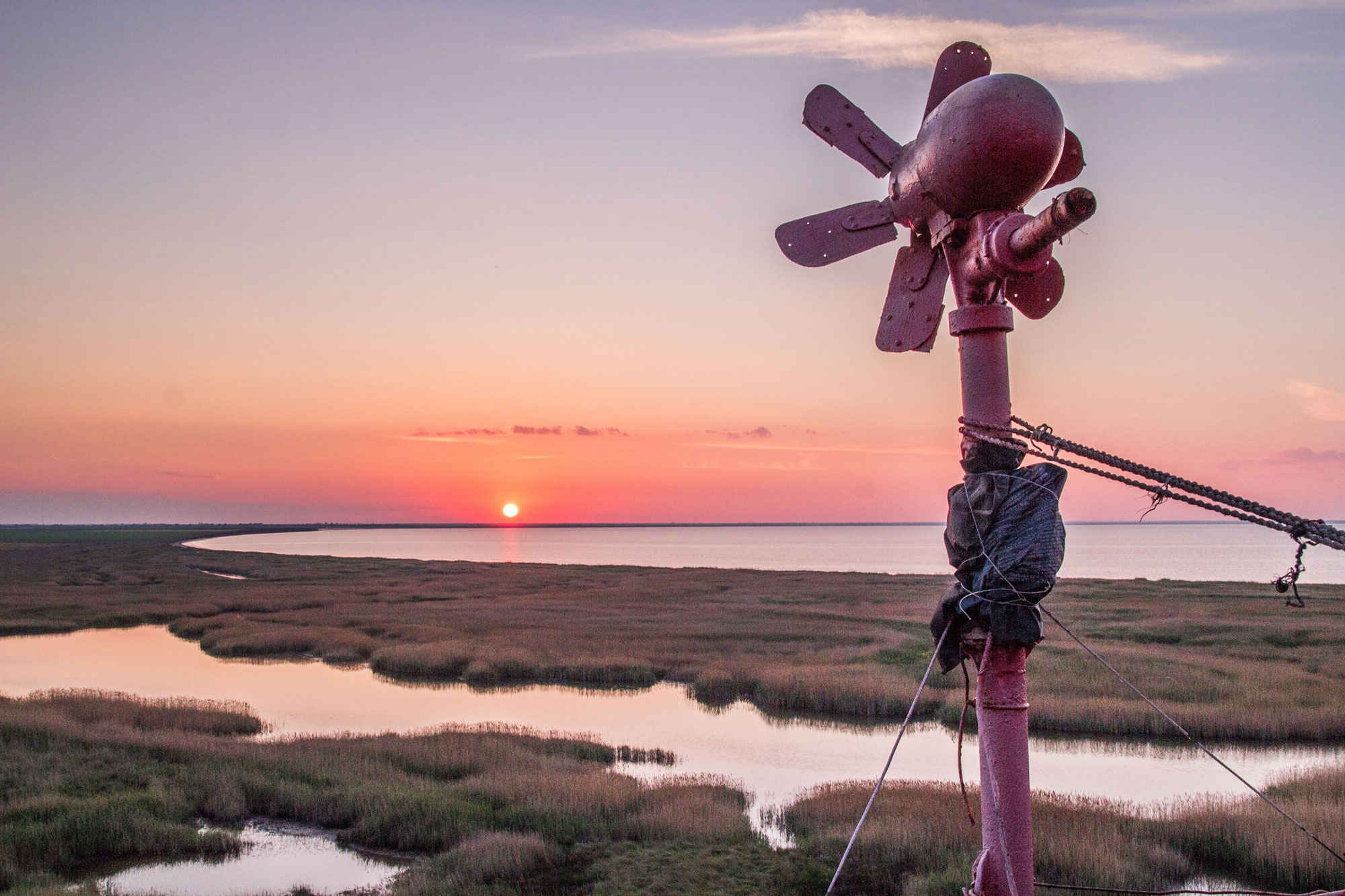
The world’s end
Tourists visit Roseika in summer and also make a stop at the spit. They put up tents and live there for several weeks. They often take pictures of the light house, but cannot go up there because it’s a sensitive facility. These places are perfect for tourism, but only few people know about them:
— It’s a beautiful place; it only needs new lease of life. There, you see, fresh coastal lake runs into a salt one, and the salt lake runs in further, up to Odesa. It’s the Black Sea spit of land, there are Katranka, Lebedivka and Vylkovo there.
Prymorske inhabitants live at the world’s end, not so much because of location as of infrastructure. There used to be bus service to Tatarbunary, Rybalske and Vyshneve and interdistrict commuting. Now there is only one bus from Odesa to Prymorske twice a day.
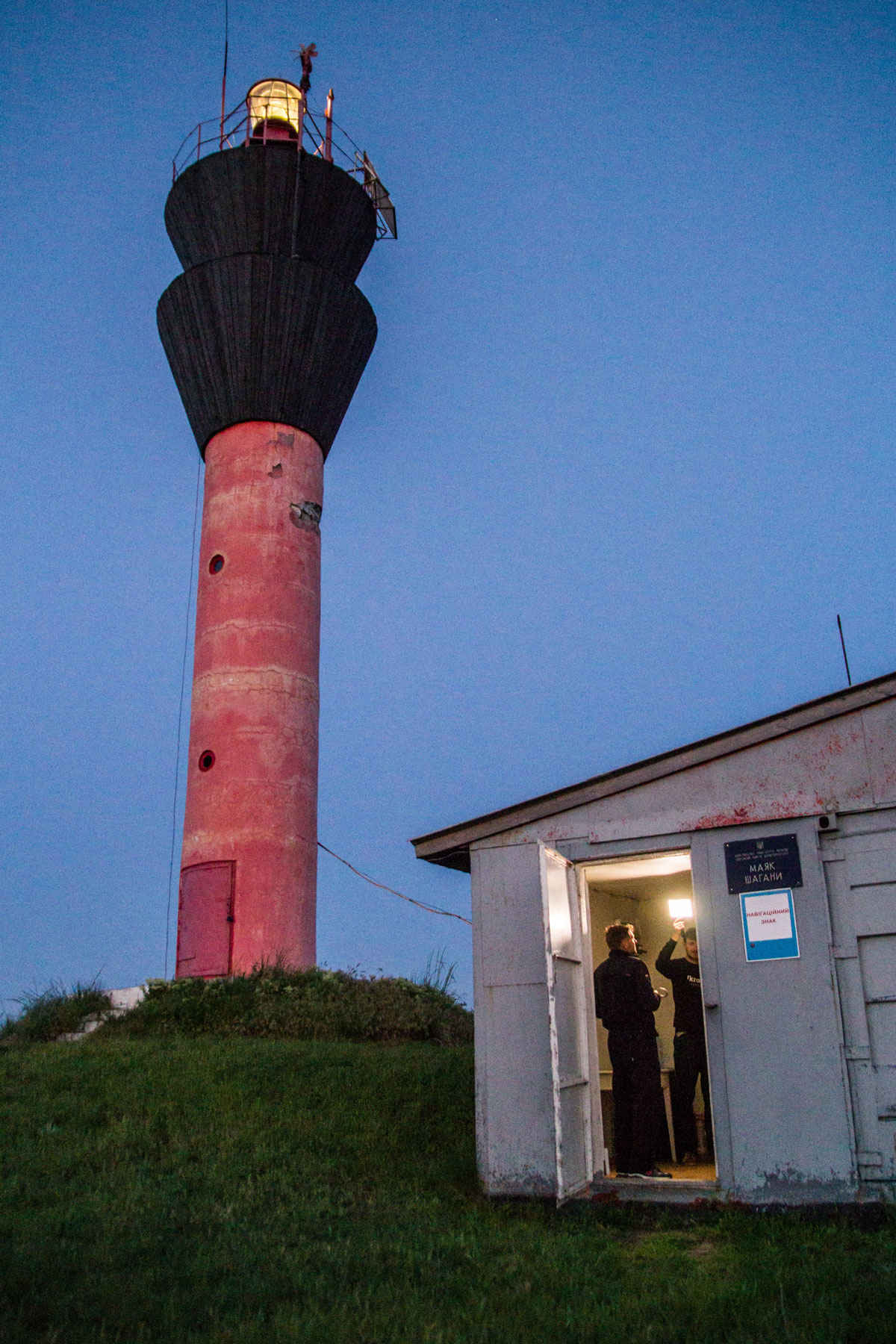
Viktor says that people in Prymorske have to stand against rich kids from Odesa who come to hunt birds. This year though there are less hunters and more birds:
— People from Denmark came here some time ago. My understanding is that they knew about the nature park here, so they asked me where they could see birds. This woman was writing a book about birds. I didn’t ask her many questions, because neither of us could understand the other well. I met her in several days and she told me there were much more birds here than in Vylkove. It’s been a long time since I visited Vylkove, so I don’t know.
Nature is the biggest mystery of this area. Living among beauty is remarkably inspiring:
— What I like the most is working surrounded by pristine nature. I come here, go up – and see a bird sitting over here, a goose flying, a pelican rowing and a pheasant calling from a tree. Have you seen a film “Mr. Robinson”? Trust me, when I come here I feel the same. Everything is pristine here. No one is ruining anything, especially since shooting has been prohibited. It’s so silent now: all birds are here, they have enough water. When you wake up in the morning you can hear a variety of birds singing…
How we were filming
Watch our video blog about our trip to Bessarabia. We went there to see the largest European pelican rookery, visit a lighthouse and discover many interesting spots of our country.

